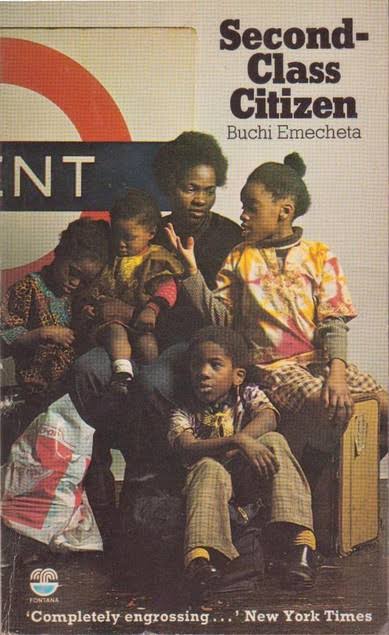📢 Follow our WhatsApp Channel for the latest literary updates!
There are many themes in Buchi Emecheta’s novel, Second Class Citizen. Some of them include themes of racial and gender discrimination, irresponsible husbandhood, early marriage, determination, patriarchy, hope, women emancipation, and failure.
For the purpose of this post, the themes in Second Class Citizen are class and gender, women and motherhood, hard work and ambition, and false conception.
Theme of Class and Gender
The theme of class and gender is one of the important themes in Second Class Citizen. The title of the novel in itself portrays a class divide within the story.

Set in post-colonial Nigeria and reflected in Adah’s experiences, the novel depicts a society crippled by cultural conflict of conservative Nigeria values and colonial values. The society is also divided by a class structure, indeed the class and gender structure are reproduced in the setting, resulting in a mimicking of the colonial era that persists in the post-colonial period.
As a child, Adah’s gender deprives her of basic education that favours her brother, Boy, while as a mother of two who joins the husband in the United Kingdom, she is meant to understand that all blacks are “second-class citizens” by the same man who should have made the difference.
While in Nigeria and working as a librarian, Adah has managed to attain the status of a first-class citizen. She has a fair amount of money and enjoys luxuries such as servants. But her move to UK demotes her to the status of a second-class citizen as it becomes evident that she is “double colonized,” first, by imperialism and then, by her marriage.
Adah is discriminated against by the political superstructure that is painted by racial prejudice in the UK. For instance, Trudy, the childminder who works for Adah, represent the colonial lanes of white supremacist towards those of Nigerian descent. Francis on his part, reveals his worst colours by increasingly imposing his dominance over her and also performing implied infidelity with Trudy on her.
Related:
- Q & A: Discuss the theme of girl-child education in Buchi Emecheta’s Second Class Citizen
- Q & A: Consider in detail Second-Class Citizen as a woman’s ideological statement in the female condition
- Buchi Emecheta’s SECOND CLASS CITIZEN and Yejide Kilanko’s CHASING BUTTERFLIES: The Point of Convergence
Theme of Women and Motherhood
The theme of women and motherhood is one of the dominant themes in Second Class Citizen. Adah is symbolic of the travails and joys of motherhood associated with the female folk in a typical African society. She is used by the writer to advocate a change of attitude towards females and to show that this change should be initiated by women themselves.

Adah is portrayed as a woman who questions the dependent act of men and struggles to free herself so as to have a will of her own. In spite of all she passes through in the course of the story, Adah never fails to put her children first. This means they can be all she has to live for. Adah’s disagreements with Francis and the other black co-tenants start from her refusal to send her children to foster parents, while her case with Trudy, regarding her treatment of Titi and Vicky, is remarkable.
Whatever it might cost, Adah, like most Nigerian mothers, is willing to give all for her children. Notably, her priority on her way to UK and on arrival is that her children will have English education and, possibly, their university studies in England.
Theme of Hard Work and Ambition
The theme of hard work and ambition is one of the discernible themes in Second Class Citizen. The protagonist, Adah, is portrayed as an intelligent, hard-working and ambitious young girl who has to fight against considerable odds to gain education for herself which is symbolically a wish to have control over her life because knowledge is a symbol of power.
Through dint of hard work and proper self-motivation, Adah is able to win a scholarship in the highly competitive secondary school examination as a result of a first-rate performance at the School Leaving Examination. She is finally able to secure a job as a librarian at the American Consulate in Lagos, a job which easily brings her the comforts of a middle-class life.
Armed with the imagination to conceive her plan, spirit, dedication, hard work, determination, heroism, and resource, and the good sense to carry it out, she triumphs over her plights.
Theme of False Conception
Significantly, Second Class Citizen starts with a reference to Adah’s dreams of going to England. Using rhetoric that clearly emphasises her innocence, she mentions how, with the help of her father, she went through adolescence with an exaggerated and false conception of Britain.
Like her father, she grows up believing that the United Kingdom is synonymous with heaven. She makes a secret vow, quite early to herself that she would go to this United Kingdom one day, and she wrongly assumes that her arrival in the United Kingdom “would be the Pinnacle of her ambition.”
When she arrives in England, she finds cold weather and people. Moreover, she is forced to live in a horrible house with inhumane living conditions. From being, with her privileged job in the American consulate, a first class citizen in Nigeria, she is reduced to a general second-class citizen in England.
Clearly, the reality is quite disappointing in comparison to her dream and preconceived notion about Britain. Although she has spent all her life dreaming about Britain, she is quite surprised that nobody cares about her arrival and what is more, that the civilized world does not look like what she was taught about in Nigeria.
Also in Similar Categories
- Plot Summary of Buchi Emecheta’s Second Class Citizen
- Buchi Emecheta’s SECOND CLASS CITIZEN: Things You Need to Know
- Chapter by Chapter Summary of Buchi Emecheta’s Second Class Citizen
- Characterisation in Buchi Emecheta’s Second Class Citizen
- Memorable Quotes from Buchi Emecheta’s Second Class Citizen
Join Our Social Media Channels:
- WhatsApp: Literature PADI
- Telegram: Literature PADI
- YouTube: @literaturepadi
- Facebook: Literature PADI











